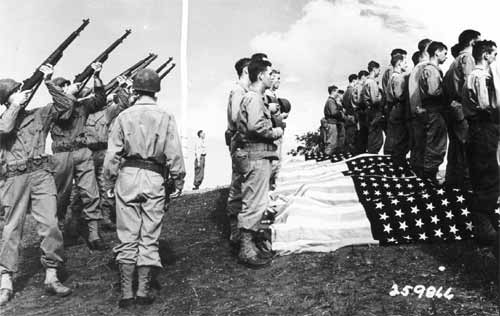I warn you now, this is a very long entry. I was not able to sleep much last night.
I think I had just watched Jorg Buttgereit's brilliant film — and his best film in my opinion — Der Todesking, about a ichain letter that makes people kill themselves, one a week. And if I didn't watch it, I was about to. “This is the Death King. He makes it so that people don't want to live any more.”
Dream Diary: October 12, 1989I'm living in some sort of apartment building. Either the sky is totally blackened from pollution or I'm living underground. I don't know. Pipes and cabling in the building are totally exposed. It's very dark and the lighting is very yellow. Several levels below me is a Chinese market where I buy my food. It's very crowded, but nobody really makes each other out in the haze I think. The market is made up of many small shelf-cubicles which contain the different items for sale. Most of them appear to be insects.
Another level down in the complex is the suicide store. It's similarly busy, and also has cubicles all over the walls containing different item. Each one is a different way to kill yourself. I think how strange it must be to be that storekeeper.
I later painted the suicide store as a part of my fine art thesis; it dispelled the unbearably nightmarish aspects I think — I hope — but still I have never forgotten it and I have never stopped exploring this world in my dreams. So still, I dream it over and over. It never stops.
Dream Diary: October 12, 2004[Long introduction which involves extended harassment of a stranger who made some nasty comment as they walked past me.] She finally breaks down sobbing. I leave, walk back out to the floor lobby, and push the elevator button. Her sobbing can be heard from the lobby, but the elevator comes and I quickly get on it before she arrives as well. I take that elevator down to the front lobby and quickly walk out of the building after scanning my ID card to leave. I get the sense they're looking at me and know what's happened. I start thinking about excuses. Thankfully my ID is fake.
I then head to the subway and go down an escalator. At the bottom of the escalator I have to scan my ID as well, which beeps and then as I'm walking away and start to head down a second set of escalators, beeps again, warning security that I'm a violence risk. I've been reported, and I'm about to be arrested.
It's not the same dream, just fifteen years later. But it is a dream I've had before, and it is a world I've been in before. Dreams are cyclical and seem to happen over and over and over, revealing less of themselves every time. Time keeps repeating itself. Not exactly the same way, no more than tire treads are the same on every revolution. But they're damn close.
Why am I talking about time?
I watched — for the second time — Going Up River: The Long War of John Kerry. I urge others to see it as well. It's in theaters, you can buy it on DVD (goingupriver.com), or you can download a bootleg for free (thekerrymovie.com). I'm not just telling you this because I want you to see how genuinely vile some of the accusations “the right” are making are, but I want you to see — and you need to see — the futility of war, and the terrifyingly repetitive nature of the anti-war movement.

From my dreams
LYSISTRATA: Don't you feel sad and sorry because the fathers of your children are far away from you with the army? For I'll wager there is not one of you whose husband is not abroad at this moment.
CLEONICE: Mine has been the last five months in Thrace-looking after Eucrates.
MYRRHINE: It's seven long months since mine left for Pylos.
LAMPITO: As for mine, if he ever does return from service, he's no sooner home than he takes down his shield again and flies back to the wars.
LYSISTRATA: And not so much as the shadow of a lover! Since the day the Milesians betrayed us, I have never once seen an eight-inch gadget even, to be a leathern consolation to us poor widows.... Now tell me, if I have discovered a means of ending the war, will you all second me?
Her proposal is that they use the only power women at the time had and go on a “sex strike” to convince their husbands end the war. At first the women refuse Lysistrata's proposal — “let the war go on,” they say, “anything but that — do not rob us of the sweetest thing in all the world” — but they do make the sacrifice, and in the end the war ends.
All is for the best; and now, Laconians, take your wives away home with you, and you, Athenians, yours. May husband live happily with wife, and wife with husband. Dance, dance, to celebrate our bliss, and let us be heedful to avoid like mistakes for the future.
I didn't really think anything of it at the time. It was “just a story” from two and a half thousand years ago. Incidentally, for those of you interested, Lysistrata is a popular opera and still plays regularly.
Moving a bit forward to the decline of the Roman Empire, Rome was engaged in eastern wars which sapped the resources of the people at home and killed many young soldiers, while the richest sectors of society became wealthy as they both collected the riches stolen from distant lands and profited from arms dealing and other military business. Slavery increased (the “big equipment” of two thousand years ago), which allowed large land owners to put small farmers out of business. These farmers became indentured servants, and their land was absorbed into large estates.
The nation became overextended, and drafting soldiers became difficult. Not because there was a shortage of poor people eager to fight, but because so much tax money was being stolen that the military was budget strapped — they couldn't fully equip their soldiers, and took to only drafting those from families well off enough to buy them their weapons and armor. Is any of this starting to sound familiar? Not long after, the Roman Empire faded away, like all empires.
Still, knowing this I didn't put two and two together. I knew that in World War One, the British had tried to institute the draft in Ireland. In response, the Irish voted in almost total unanimity for Sinn Fein (leaving no other viable political parties), and the antiwar movement in Ireland was the straw that broke the camel's back, leading, ironically, to civil war (or better put, a War of Independence).

Poor people die to make rich people richer
The entrance of the United States into the world war on April 6, 1917, was the greatest victory that the American plutocracy has won over the American democracy since the declaration of war with Spain in 1898. The American plutocracy urged the war; shouted for it; demanded it; insisted upon it, and finally got it.The plutocracy welcomed the war not because it was a war, but because it meant a chance to get a stronger grip on the United States.
[The plutocrats believe there are some things worse than war]: the confiscation of special privileges; the abolition of unearned income; the overthrow of the economic parasitism; the establishment of industrial democracy. The plutocrats would welcome a war that promised salvation from any such calamities; they would also welcome a war that promised greater foreign markets, the destruction of foreign competition, more security for property rights and a longer lease on life for plutocratic despotism.
The plutocrats, or wealth lords, ... were for the war from the beginning. They urged preparedness; they demanded national defense; they cried aloud for reprisals upon Germany because ... it gave them a chance to deliver a knock-out blow to the American democracy.
Big business was in public disfavor. Advertisements, "boiler-plate," news stories, press agents and blatant philanthropies had little effect. The people would not forget the "public be damned" days of the business buccaneers. They had learned about the rebates, the unfair rates, the debauchery of public officials and the criminal practices by which many of the most successful of the big business men had climbed into power. The people were "wise" to big business, and they were getting wiser every day.
Problem was, at this point in history, America, unlike now, was an educated nation with radical political leaders, the labor movement was strong, newspapers were responsible, and the public was vehemently antiwar. So how could the plutocracy actually pull these American people into war (not that they hadn't already done it quite a few times already). It's very simple and we've seen it repeat — we all know how crooked politicians trick the public into war, don't we?
How could the plutocracy — the discredited, vilified plutocracy — get public opinion? There was only one way: it must line up with some cause that would command public confidence. The cause that it chose was the "defense of the United States."With the immense power of the public press at their disposal; possessing unlimited means; united on a common policy, the plutocracy spread terror over the land.
The campaign was intense and dramatic. Japanese invasions, Mexican inroads, and a world conquest by Germany were featured in the daily press, in the magazines, on the movie screens and in public addresses. Depredations, murder and rapine were to be the lot of the American people unless they built battleships and organized armies. From preparedness to patriotism was a short step. The preparedness advocates had used the flag freely. They had played national airs, evoked the spirit of the founders of American democracy and worked upon the emotions of the people until it was generally understood that those who favored preparedness were patriots.
Patriotism ran high. Enthusiasm for the flag increased. Patriotic committees were organized, but when the names of the patriots appeared in the newspapers they were distinguished by one outstanding fact, the vast majority of them were the successful business and professional men who were the center and forefront of the patriotic movement just as they had been the center and forefront of the preparedness movement.
The price of flags rose rapidly — the flag manufacturers took this opportunity to get their share of the good things that were "going round" - nevertheless, the workers by the hundreds of thousands "contributed" to provide flags for the establishments in which they were employed. Men were discharged when they refused to make such "contributions."
You know the rest of the story. 1918 marks the first year that US income tax passed a billion dollars and hit over five times that by 1920. Over a hundred thousand Americans were killed, and millions more were killed around the world in a war that America did everything it could to extend as far as the profits would allow. I've quoted here before from Smedley Butler, at the time America's most decorated soldier. Upon returning home from World War One, he wrote in his book War is a Racket,
War is possibly the oldest, easily the most profitable, surely the most vicious racket. It is the only one international in scope. It is the only one in which the profits are reckoned in dollars and the losses in lives.A racket is best described, I believe, as something that is not what it seems to the majority of the people. Only a small "inside" group knows what it is about. It is conducted for the benefit of the very few, at the expense of the very many. Out of war a few people make huge fortunes.
In the World War [I] a mere handful garnered the profits of the conflict. At least 21,000 new millionaires and billionaires were made in the United States during the World War. That many admitted their huge blood gains in their income tax returns. How many other war millionaires falsified their tax returns no one knows.
How many of these war millionaires shouldered a rifle? How many of them dug a trench? How many of them knew what it meant to go hungry in a rat-infested dug-out? How many of them spent sleepless, frightened nights, ducking shells and shrapnel and machine gun bullets? How many of them parried a bayonet thrust of an enemy? How many of them were wounded or killed in battle?
Out of war nations acquire additional territory, if they are victorious. They just take it. This newly acquired territory promptly is exploited by the few the selfsame few who wrung dollars out of blood in the war. The general public shoulders the bill.
And what is this bill?
This bill renders a horrible accounting. Newly placed gravestones. Mangled bodies. Shattered minds. Broken hearts and homes. Economic instability. Depression and all its attendant miseries. Back-breaking taxation for generations and generations.
World War Two — which I've explained in detail in the past that America entered fraudulently at the cost of many lives at Pearl Harbor — also had an enormous antiwar movement, lead in part by Charles Lindberg (you know, the guy who was the first to fly across the Altantic Ocean, in the Spirit of St. Louis). He spoke out vehemently against the war or was he just speaking out against the Jews? That's certainly hinted at as after the war started he joined with Ford Motor Company and United Aircraft who profited greatly from America's involvement along with many other corporations.
If you really want to get interesting, there were also antiwar movements in Italy and Germany as well. The same government forces and the same corporate forces — sometimes literally the same corporation — acted in unison to silence and in some nations even ban pacifist and antiwar publications. And, like so many times before, rich people conspired to trick their slaves into fighting for their amusement and profit. The eternal dance, right?
Hey, here's a kicker. How did America get started? Oh yeah, it was a war profiteering colony of Britain. Is it any surprise it's caught in this goddamn evil cycle? Not that this entry is about Bush, but the Bush family is stuck in the middle of all this as some of America's best known war profiteers, “supporting” (selling to, as I mentioned above) both the Nazis and the Americans from the 1920s until the end of WWII, although the Nazi dealings were presumably stopped when in 1942 several Bush-owned corporations that were dealing with the Nazis were seized by the US government this is all a matter of public record, but no one cares about history, do they? Clearly no one cares, since even Dick Cheney admits that he's been investigated for selling military technology to Iran and Libya, and has paid millions of fines for defrauding the US government.
In any case, you know about the wrongness and profiteering in Korean, Vietnam, Iraq, and other modern wars so I won't talk about them in detail — but I urge you to watch Going Up River so you can be reminded of it. While you're at it, read Michael Moore's new book of extremely disturbing letters from soldiers. Most of you are old enough to have seen these wars happen with your own eyes at least once or twice. Many of you reading this have family members who've played roles in it. I remind you again of what Nearing wrote in conclusion of his 1917 pamphlet.
They aroused the people, agitating and irritating them, until they were frantically repeating the blatant lie that the real enemy of American liberty lived in Berlin. Then they stung them with high prices, filched their liberty, plunged them into war, took a million of their brothers and husbands and sons to wage a war of aggression on the battlefields of king-ridden Europe, and because nothing happened at once, they believe that they had won. They had won victory and death.The plutocracy and the democracy cannot exist side by side. If the plutocracy wins, dollars rule; if the democracy wins, people rule. There can be no alternative and no compromise. During the past three years of struggle, the democracy has lost every move. The power of the plutocracy has been strengthened immeasurably.
1 9 1 7.
Folks, this cycle has been repeating itself for as long as we've had large scale societies. It can be documented clearlyback to the earliest recorded human history. It's not getting better. It's not getting worse. It's a constant cycle that taps our resources and wastes us as beings capable of such beauty and greatness. War is an ignorant waste, and people who support it are treasonous to our species and our planet. Life to the traitors. Life to all.
I'm not sure why I'm writing all this. I don't know if it reaches anyone or not. The hit counter keeps going up, but few people ever say anything in response. Maybe I'm just trying to explain why I'm not insane for wanting to move to a ranch in Africa. Yeah, Africa. I want to move to Africa. Start the fucking joke factory. All this that we do is just so wrong, and it will be the end of us as it distracts us from our impending doom. I don't want to play this stupid, stupid game any more and I just want to go somewhere that I and my family — and friends — don't have to take part.
The immense irony of all this is that my grandfather had the same fears a half century ago and moved his whole family to Africa. He chose South Africa though (I'm leaning toward Namibia), and had to leave when it started to collapse politically, ending up in lush Canada.

She's coming in 12:30 flight
I looked yesterday at a map of nitrogen levels in our atmosphere. There is a huge spike over the Ontario and New York State area (which is expected), and another one over China. I've written before about the gargantuan environmental problems in China, but this reminded me of another one over there that I haven't mentioned before. Did you know that China is on fire, border to border?
China is both the world's largest coal producer (three quarters of its energy production), and the largest miner. If you added up every other country in the entire world you'd just barely equal China's consumption. China is covered in coal boarder to border, and thus in mines border to border. Coal is a lot more volatile than you'd think. It can spontaneously ignite, and once an oil seam is on fire, it's hard to put out — there are coal fires burning in China that are believed to be over a thousand years old at this point.
Many of the coal fires in China are seams, which means that there are huge fires raging underground (and above ground) all over the country. Not only does this increase the average temperature (wreaking havoc on the microorganism and plant life in the area), but also leads to sink holes, and huge amounts of pollution. Effects are both local (increased cancer, digestion problems, lung problems, and so on) and global — China's coal fires (this does not include any of the other Chinese pollution sources) are believed to account for 3% of all CO2 output on the planet at this point, and the number grows every day.
Perhaps you're wondering why I mention microbial life so much. I've mentioned before about how in simple terms if you kill the bottom of the food chain — microbial life — you kill everything above us, and, like it or not, that includes us. Perhaps though you're thinking to yourself that it doesn't matter — after all, we can just plant stuff and it'll grow, right? Let me put it simply: if your midi-chlorian count is low, you're not going to be much of a Jedi knight.
According to an article presented by the Imperial College London in this month's Nature Biotechnology, there are about 500 different species of symbiotic microorganisms that live inside the human body. These organisms add up to approximately 100 (one hundred) trillion cells. To put that into context, the human body is made up of approximately 10 (ten) trillion cells. To put that into context, that means that what we believe is and perceive as a “human” is in fact a symbiotic organism that is only 9% human, with the remaining 91% being bacterial in nature.
These bacteria do things like digest our food for us, and work with our immune system to keep us alive. They are also in our brains and interact with our neural nets. They are believed to be why humans are so complex, but have such simple genetics in comparison… Either way, without them we do not survive, and changing their nature changes our nature.
But still, war rages on, distracting us and confusing us, and I believe it will continue to rage on as far more pressing problems develop around us. But we will ignore those problems, until it's too late and people just start dropping dead on the street and the horror overwhelms us.
"We left the camp after we had inoculated the children for Polio, and this old man came running after us and he was crying. He couldn't see. We went back there and they had come and hacked off every inoculated arm. There they were in a pile... A pile of little arms. And I remember... I... I... I cried... I wept like some grandmother. I wanted to tear my teeth out. I didn't know what I wanted to do. And I want to remember it. I never want to forget it. I never want to forget. And then I realized... like I was shot... Like I was shot with a diamond... a diamond bullet right through my forehead... And I thought: My God... the genius of that. The genius. The will to do that. Perfect, genuine, complete, crystalline, pure. And then I realized they were stronger than we. Because they could stand that these were not monsters... These were men... trained cadres... these men who fought with their hearts, who had families, who had children, who were filled with love... but they had the strength... the strength... to do that. If I had ten divisions of those men our troubles here would be over very quickly. You have to have men who are moral... and at the same time who are able to utilize their primordial instincts to kill without feeling... without passion... without judgment... without judgment. Because it's judgment that defeats us."
Surely anyone who's read this far into this insanely long entry can recognize the quote. But it's not judgment that defeats us, it's judgment that saves us: The choices you make define your future, and the choices we make together define our future.
Oh, that reminds me. I'm going to include one news link before I go: Major assaults on hold until after US vote. Bush has ordered the military to put “on hold” major assaults until after he wins the election. Can't have any bad press when 1,500 Americans are killed in the Tet Offensive next phase of the Iraq war, can we? Who cares anyway, political profit strategy comes before military strategy.
This is wrong.



Post a Comment